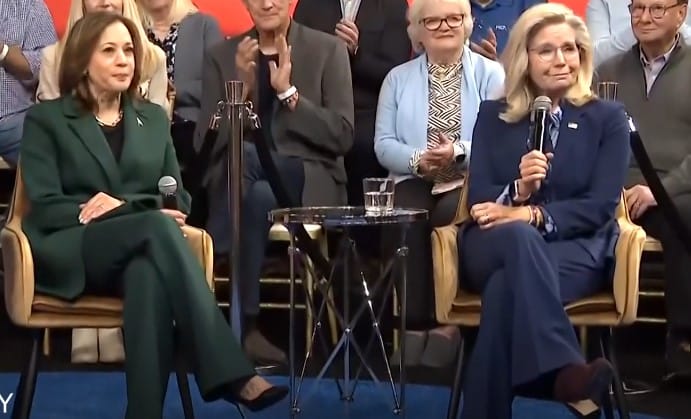Kamala Harris and Liz Cheney join forces across key battleground states to appeal to moderate Republicans, casting Donald Trump as a divisive danger. The two aim to unite voters across party lines, emphasizing the need for a stable two-party system.

Harris and Cheney Forge Bipartisan Path in Battleground States
Kamala Harris and Liz Cheney stood together on Monday in three crucial battleground states, delivering a united message: Donald Trump is a menace to the nation’s democratic foundations, and voters should cross party lines to prevent his return to power.
This unusual alliance—between the Democratic Vice President and a former Republican Congresswoman—defies traditional election strategies, which usually focus on rallying the party’s base. Instead, Harris is reaching out to disillusioned Republicans, especially college-educated suburban voters who have grown wary of Trump’s erratic behavior and divisive rhetoric.

Cheney’s Bold Stand: A Country Over Party
Liz Cheney, once a staunch Republican leader from Wyoming, was ousted from her party for opposing Trump’s role in the January 6th Capitol insurrection. On Monday, she made it clear she hasn’t wavered in her fight against the former president. “Kamala Harris is someone you can trust,” Cheney said, speaking before a crowd in Wisconsin. Her words underscored the gravity of the moment as she urged Republicans to vote their conscience, even if it means voting across the aisle.
Despite their differences—Cheney is pro-life and Harris pro-choice—the two stood together in their belief that Trump’s politics are dangerous. Cheney lamented the extreme abortion restrictions in some states, suggesting that her party has gone too far since the overturning of Roe v. Wade.
A New Kind of Election: Beyond Partisan Divides
In a moment that almost seemed surreal, conservative commentator Charles Sykes quipped, “Dogs and cats together, in this strange moment,” referring to the unusual partnership. Yet, for Harris and Cheney, the stakes are too high for politics as usual. Both spoke of a time when Democrats and Republicans could disagree without undermining the very fabric of the nation’s democracy.
Harris emphasized the toll Trump’s rhetoric has taken on America, saying, “He encourages us to point fingers at each other.” In contrast, she called for unity, arguing that most Americans share more in common than what divides them.
The Suburban Strategy: Key Counties Hold the Balance
Harris and Cheney’s three stops—Chester County in Pennsylvania, Oakland County in Michigan, and Waukesha County in Wisconsin—were carefully chosen. Each of these counties favored Nikki Haley over Trump in the primaries, showing that there is room for moderate, anti-Trump Republicans to make a difference.
While the margins may be slim, those votes could tip the scales. Harris, keenly aware of the stakes, pushed hard for every last vote, knowing that a few thousand ballots could determine the outcome in key swing states.
Trump’s Fury and Cheney’s Final Word
As expected, Trump lashed out at Cheney on social media, calling her “dumb as a rock” and labeling her a “war hawk.” Unshaken, Cheney fired back, encouraging Republicans to quietly vote their conscience. “There will be millions who do so on November 5th,” she predicted, casting her lot with the disillusioned Republicans ready to break ranks.
Harris echoed the sentiment, urging voters to take Trump’s words seriously. “It’s not a joke,” she warned, calling Trump’s rhetoric more than just bluster—it’s a genuine threat to American democracy.
A New Political Reality?
For Harris, this partnership with Cheney marks a shift in her campaign, moving away from large rallies and toward smaller, more intimate gatherings. Voters, she believes, are weary of the chaos, looking for someone to restore a sense of normalcy. In one poignant moment, she recalled a story of a child afraid to attend school due to the threat of gun violence, bringing the room to silence.
Cheney’s presence on this tour may be an unusual move, but in this highly unpredictable election, it’s a gamble Harris is willing to take. With Cheney’s backing, she hopes to not only solidify her position among Democrats but also win over moderate Republicans eager for stability and unity.